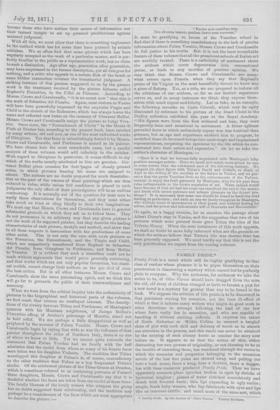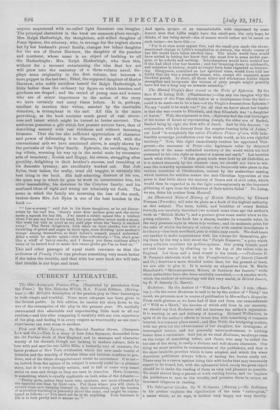cal models, cannot change their authors on the ipse dixit
of even penetration in discovering a mystery which cannot but be perfectly the best critics. But in all other instances Messrs. Crowe and plain to everyone. Why the authoress, for authoress we take the Cavalcaselle show the same painstaking spirit, and we think this writer to be, of Olive Varcoe should have dragged from the mire will go far to persuade the public of their trustworthiness and the old, old story of children changed at birth to furnish a plot for
a new novel is a mystery far greater than any to be found in the When we turn from the critical inquiry into the authenticity of book. We suppose the solution of this puzzle is to be discovered in pictures to the biographical and historical parts of the volumes, that persistent craving for sensation, not the least ill-effect of we find much that creates an unalloyed interest. The descrip- which is that it induces many writers who might do good work in tons of the rivalry between Titian and Porde none, of Mantegna's other directions to attempt following the lead of the few quarrels with his Mantuan neighbours, of Jacopo Bellini' s whose forte really lies in sensation, and who are capable of Florentine affray, of Aretino's patronage of Moretto, stand out handling it without exciting ridicule. It requires the talent
in bold relief. We are perhaps a little disappointed as well as of Emile Gaboriau or Wilkie Collins to unravel a tangled
perplexed by the account of Palma Vecchio. Messrs. Crowe and skein of plot with such skill and delicacy of touch as to absorb Cavalcaselle begin by saying that wide as was the influence of that our attention in the process, and this result can never be attained
painter throughout the cities of Northern Italy, there is no one by the untying of such clumsy knots as cumber the story now * Family Pride. By the Author of 'Olive Vareoo," Tinsley Brothers. anyone acquainted with so-called light literature can imagine. The principal characters in the book are common-place enough ; Mrs. Ralph Hatherleigh, the thoughtless, self-willed daughter of Peter Spence, the attorney, who, in revenge for the neglect shown her by her husband's proud family, changes her infant daughter for the son of Heater Hartrow, the daughter of the poacher and murderer, whose name is an object of loathing to all the Hatherleighs ; Mrs. Ralph Hatherleigh, who does this, without for a moment entertaining the idea that her act will grow into the mainstay of a three-volume novel, dis- plays some originality in the first volume, but becomes a mere puppet in the last two ; Ethel, the supposed daughter of Hester Hartrow, who nobly sacrifices herself for Ralph Hatherleigh, is little better than the ordinary lay figure on which heroism and goodness are draped ; and the crowd of young men and women who are of minor importance to the action of the story we have certainly mot many times before. It is, perhaps, needless to mention that virtue, assisted by the inevitable detective, is triumphant in the end. All this is the more provoking, as the book contains much proof of real clever- ness and talent which might be turned to better account. The authoress possesses a gift which few present writers have, that of describing scenery with real vividness and without becoming tiresome. That she has also sufficient appreciation of character and power of delineating it to dispense, if she will, with the conventional aids we have mentioned above, is amply shown by the portraits of the Byles' family. Ephraim, the sneaking, fawn- ing villain, worming his way up in the social scale by successive acts of treachery ; Keziah and Happy, his sisters, struggling after gentility, delighting in their brother's success, and trembling at his domestic tyranny, are excellently worked out. But Job Byles, their father, the crafty., cruel old trapper, is certainly the best thing in the book. His half-admiring distrust of his son, the quiet way in which he goes to work to countermine him, his utter insensibility, his devotion to the Coryton family, and his confused ideas of right and wrong are admirably set forth. The scene in which the family are mourning the loss of the meek, broken-down Mrs. Job Byles is one of the best touches in the book :— '4 Lor-a-mnsey !' said Job to his three daughters, as he sat discon- solate by his turf firo, there's your dear mother gone and she never made a squeak for her life. I've heerd a rabbit squeal like a hinfant when I've put my foot on his head, but your mother never made a moan. She went out just as quiet as my ould pipe when the 'Lamy is smoked away.' The, three daughters, with tears on their cheeks, but with a twinkling of greed and anger in their eyes, were dividing 'poor mother's things' among themselves, so their father's remark passed unheeded. After a while he spoke again—this time reflectively—' Yes, she's gone like a whiff of 'homey-smoke, and I destiny you three maidens abbn't waun of 'co lamed how to make thic sweet giblet-pie I'm so fond on.'" This and other passages of equal merit convince us that the authoress of Family Pride can produce something very much better if she takes the trouble, and that with her next book she will take that trouble is our hope and trust.































 Previous page
Previous page